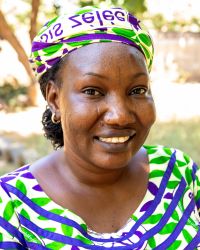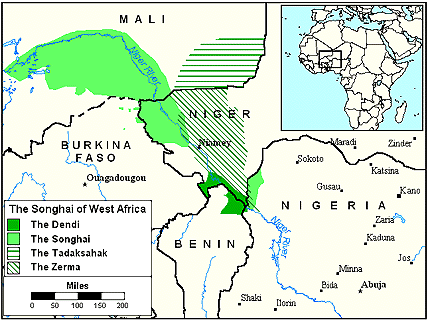The Songhai Empire of West Africa of the 15th and 16th centuries was based on trade. Textiles, weapons and horses came North Africa. Slaves, salt and gold came up from the south. After the Songhai Empire fell to an army from Morocco, the majority of the common people stayed in Mali and Niger while many nobles traveled south to start a new life. Today the Songhai-Koyraboro make up about five percent of the Malian population. Songhai people speak many dialects; Koyraboro is one of them. Mali gained its independence from France in 1960. Unfortunately, since 1960 Mali has seen many military coups, dictatorships and human rights violations. Mali saw a drought from 1968-1974 in which thousands of people died. Mali is one or the poorest nations in world despite having gold mines. The profits from gold mining seldom reach the Malian people. A number of Jihadist groups operate in Mali often destroying villages and murdering or kidnapping the Malian people.
Most Songhai live in the south savannah region of Mali near the Niger and Senegal Rivers. Men work the fields growing millet, grains, ground nuts, manioc, and maize. Women take care of children, have small plots of land and grow fruits and vegetables. Some families also raise cattle and goats for their meat, milk and hides. Some Songhai make a living by fishing in the rivers and lakes. A Koyraboro Songhai man may marry up to four wives if he can afford them. Most men have only one wife. Songhai parents encourage their sons to get a secondary education. Most girls may only attend primary schools for a few years before they begin working with their mothers to support the family. Young men get married in their middle twenties. Girls marry in their early or middle teens. First born sons often are pressured to marry a cousin in order to keep the wealth in the family. Elders rule village life making the judicial decisions and conducting affairs with outsiders. Songhai society was traditional with sons following the profession of their fathers. In previous times there were three castes among the Songhai community, nobles, peasants and slaves.
Almost all Koyraboro Songhai in Mali are Sunni, the largest branch of Islam. Their Islam is highly influenced by folk religion or a belief that spirits inhabit the objects of nature. Each village has a shaman who performs rituals to stop the evil spirits from bringing drought and harm to the village harvest and animals. The shaman also gives out charms and amulets to protect the people. The Songhai try to obey the teachings of the Koran and the prophet Mohammad. Sunnis believe that by following the Five Pillars of Islam that they will attain heaven when they die. However, Allah, the supreme God of the universe, determines who enters paradise. Sunnis pray five times a day facing Mecca. They fast the month of Ramadan. They attend mosque services on Friday. If a Muslim has the means, he or she will make a pilgrimage to Mecca once in his or her lifetime. Muslims are also prohibited from drinking alcohol, eating pork, gambling, stealing, using deceit, slandering, and making idols. The two main holidays for Sunni Muslims are Eid al Fitr, the breaking of the monthly fast and Eid al Adha, the celebration of Abraham's willingness to sacrifice his son to Allah. Friday is the day of rest in which Songhai attend the local mosque.
Most Songhai-Koyraboro live simple, adequate lives except in times of drought. Unfortunately, these droughts occur regularly and have left many children as orphans in refugee camps. Malnutrition is a problem for many Songhai. A majority of the Songhai-Koyraboro have never heard a clear presentation of the gospel in their heart language. Christian workers can come and share the love of Jesus with the Songhai in practical ways.
Ask the Lord to send Christian agricultural workers, educators, and medical personnel to serve the Songhai-Koyraboro of Mali. Ask the Holy Spirit to grant wisdom to mission agencies focusing on the Songhai-Koyraboro. Ask the Lord to save key Songhai-Koyraboro leaders who will boldly proclaim the good news. Pray that God will strengthen, embolden, and protect the very few groups of Songhai believers. Ask the Lord to raise up a Disciple Making Movement among the Songhai-Koyraboro of Mali in this decade.
Scripture Prayers for the Songhai-Koyraboro in Mali.
| Profile Source: Joshua Project |











